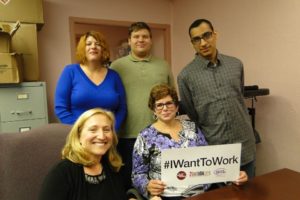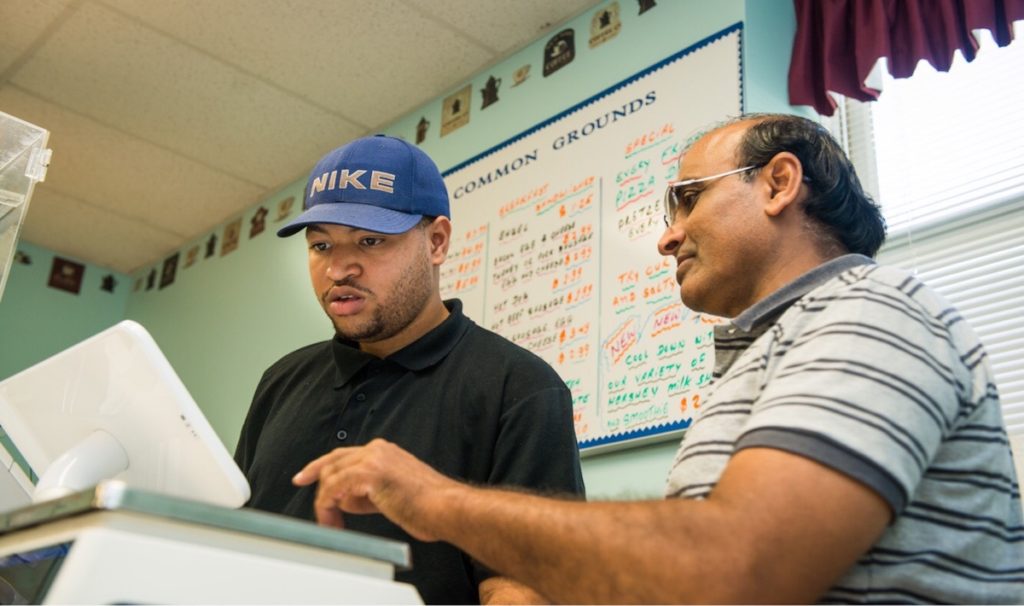To diversify hiring, let employees with intellectual disabilities demonstrate their skills
 January 17, 2018
Category: Feature, Featured, Long, Method
January 17, 2018
Category: Feature, Featured, Long, Method
Disclosures
Editor's note: Woods Services is not opening a second off-campus location and mention of one has been removed. (1/18, 10:40 a.m.)Employment is a goal typically realized by developing desirable skills and then getting hired to use them. But what about when the employee’s abilities or needs don’t fit an employer’s usual expectations?
In 2016, there was a 38-percent employment rate in Pennsylvania among those with disabilities. Two local organizations, Neurodiversity in the Workplace and Woods Services, are working to increase the hiring of those left out of the workforce by matching employees’ skills and needs to suitable opportunities.
Neurodiversity in the Workplace is an initiative of The Arc of Philadelphia, part of the SpArc Philadelphia family of organizations. “Neurodiversity” characterizes diverse neurological conditions as natural, genetic variations that do not preclude individuals from functioning at high professional levels. Advocates wish to establish neurodiversity as critical to workforce diversity — and as an advantage rather than a disability.

Arc of Philadelphia reps with Sen. Christine Tartaglione promoting the Arc’s #IWanttoWork campaign. (Photo by Bonnie Squires via facebook.com/TheArcPhilly)
The initiative builds on this movement to help those with autism spectrum disorders (ASD) overcome unique employment hurdles. Young adults with ASD have the lowest rates of employment among peers with other developmental differences.
Neurodiversity in the Workplace brings together individuals with ASD and companies that are open to a neurodiverse workforce, allowing prospective employees to showcase their skills to hiring managers; it began in 2013 with a partnership with SAP toward the goal of employing individuals with ASD.
Director Joseph Riddle said he believes this is a better hiring process for those with ASD because it removes certain social standards, such as eye contact or communication style, which are usually part of the hiring process and put individuals with ASD at a disadvantage.
“If we can help change the culture of the company to be more inclusive, individuals with ASD can easily be integrated as loyal and happy employees,” Riddle said.
In the last three years, Neurodiversity in the Workplace has placed 29 clients into full-time positions at seven different companies, including in software and accounting, with 100 percent retention. The organization has also trained over 2,000 professionals to work with a neurodiverse population — an important part of its mission to get more companies to discuss, attend conferences about and engage in hiring neurodiverse individuals.
While Neurodiversity in the Workplace is closing the employment gap for a highly skilled population, Woods Services helps develop vocational skills among individuals who would not otherwise have the opportunity.
As a population health management organization, Langhorne-based Woods provides health, education, housing, case management services and more to children and adults with exceptional medical and behavioral challenges. It also employs service recipients at its enterprises, most notably the Yellow Daffodil Flower and Gift Shop.
Over the last 50 years, the flower shop has evolved from a greenhouse rotation on the Woods campus to a social enterprise with an on-campus workshop and off-campus storefront. Individuals are hired based on their abilities and interests and do jobs in floral arrangement, inventory and customer service.
“Skills gained at Yellow Daffodil are highly transferable and can lead to community-based jobs,” said Katie Carnevale, communications manager at Woods. “We can quantify and describe what each individual is capable of based on his or her success at the shop.”
Woods also offers employment opportunities at Common Grounds, Woods’ on-campus café, and BeechTree, a body product shop that started as a work unit within Woods’ Beechwood NeuroRehab and was recently established as a standalone social enterprise. At BeechTree, adults with acquired brain injuries create the products, design artwork and represent the company at local events.
Those who have succeeded at these enterprises have advanced to working at local businesses, including a hotel, clothing store and restaurant. Carnevale said she believes these experiences also help shape residents’ hopes for their futures.
For instance, one young man who thrived as a Common Grounds employee has since graduated and plans to open his own restaurant, Carnevale said. Woods is working to expand its social enterprises and offer more employment, but establishing its competitive advantage to keep the businesses sustainable has been a challenge.
Employers have the ability to make a big impact through modifications to their hiring practices — and some are — but consumers should also remember their own purchasing power and call for products of a diverse workforce.
“As large corporations increasingly embrace diversity in their workforces as mutually beneficial, they give their voice to this movement,” Carnevale said. “Then, smaller, local businesses will take notice, too.”
Trending News











